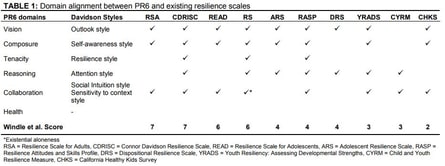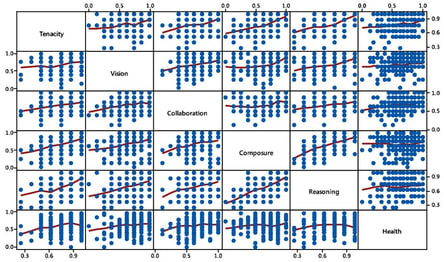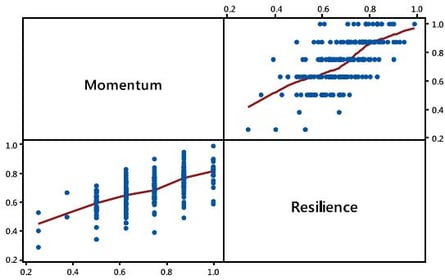RES2016
RES2016
PR6 & Neuroscience Fundamentals
Neurobiological fundamentals of the PR6 resilience scale and organizational application

Paper: Neurobiological fundamentals of the PR6 resilience scale and organizational application
Psychological resilience is currently viewed as being primarily a mental construct, with few measurement scales explicitly considering health hygiene factors as an integral component that facilitates healthy adaptation to adversity. Ongoing research has provided greater clarity on the neurobiological nature of psychological resilience, suggesting that health hygiene factors affect mental wellbeing on a neurobiological basis.
Methods
An existing neurobiological model was used as the basis for PR6 resilience domains which was then compared to other resilience scales for similarity in domain coverage. The PR6 was developed and subsequently applied using two modes (digital delivery, paper-based) to groups of working professionals (Healthcare, Finance). Internal consistency of the PR6 was tested, along with correlation between health hygiene factors and current resilience domains. Differences in resilience between industry, gender, and age groups were considered.


results
PR6 resilience scores showed good internal consistency over 16 items and, alongside correlation studies, confirmed that health hygiene factors have a statistically significant relationship with psychological resilience. Domain variances in groups indicated lower health hygiene scores in the Finance industry group, as well as with males. Emotion regulation (Composure domain) was found to be higher in the Healthcare industry group. Forward-looking items were also found to improve consistency and correlate with higher levels of resilience.
Conclusion
We conclude that health hygiene factors should be considered in conjunction with traditional psychological resilience domains, and that the PR6 is a valid psychometric scale through which measurement can be applied. Forward-looking items (approach, avoidance motivation schemas) were found to have a strong positive correlation with overall resilience scores, suggesting approach motivation schemas favourably impact healthy adaptation to difficult circumstances and stress management. The foundations of each resilience domain measured by the PR6 provides for targeted treatment to improve holistic resilience capacity, and industry application in this study shows efficacy for both point-in-time and forward-looking psychological resilience assessment.

More research from us
Predictive 6 Factor Resilience Scale
The PR6 is an advanced and efficient resilience psychometric measurement. Through a 3-min questionnaire, the PR6 identifies resilience across 6 distinct domains of resilience.
How resilience benefits business (Infographic)
Mental health costs are growing globally. Fortunately, investing in mental health curbs costs & helps people to live better lives. Save $6,238 through improved resilience per employee a year.
89% Participation & 91% of active participants improve
Case Study – Building on a clear understanding of the requirements, we developed four work streams to achieve a measurably successful outcome.
5 Guidelines to run the best resilience training program
Far too many resilience programs run without measurement, leaving management with no idea if the investment was worth it.
